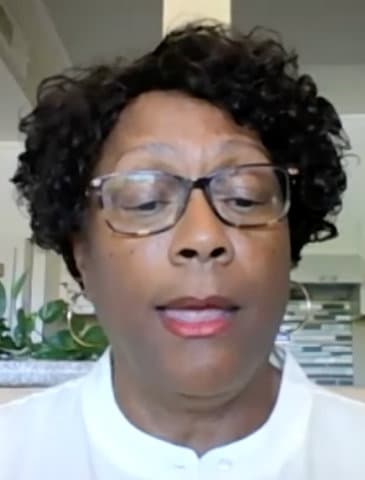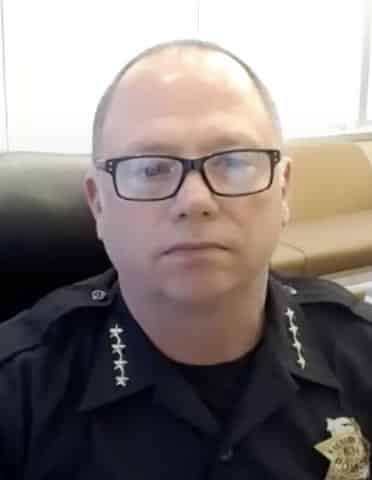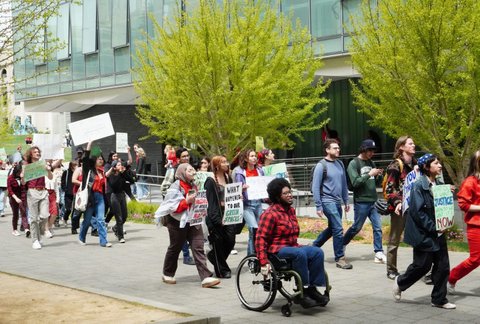
12 Jun Panel Outlines Strategies for Battling Hate, Hate Crimes

Walnut Creek community activist Mary C. Taylor moderated the May 18 online panel discussion “Standing Up to Hate Crimes in California.” (Screenshot captured by Michael J. Fitzgerald / The CC Pulse)
By Michael J. Fitzgerald
A three-person panel offered a wealth of insight and advice on battling hate crimes during a presentation May 18 titled “Standing Up to Hate Crimes in California.”
The event was sponsored by the Contra Costa County Library and the League of Women Voters chapters from West Contra Costa County and Diablo Valley. The moderator was Mary C. Taylor, a Walnut Creek community activist,
Becky Monroe of the California Civil Rights Department outlined the various resources of her state agency, including a new California Versus Hate program launched May 4. She said that her department works across the entire spectrum of arenas in which hate crimes occur.
“We recognized that hate does not happen in a vacuum,” she said. “We enforce a whole host of civil rights laws.” Those laws include the Unruh Civil Rights Act, which deals with public accommodations; the Fair Employment and Housing Act; Equal Pay Act; the Disabled Persons Act; and the Ralph Act, which involves civil claims for hate violence and threats.
Monroe encouraged people to spread the word about the California Versus Hate Resource Line and Network, a community-centered approach to combat hate.
“People need to remember there is support when you look for it,” she said. “You can reach out by phone or online.” The resource line offers advice on all options and potential actions. “The needs of people targeted for hate can really vary.”
Monroe also noted that hate crimes and incidents of hate are dramatically underreported.
Official national numbers in one counting by the U.S. Department of Justice indicate the number of hate crimes is as low as 10,000 per year across the nation. But a report by another arm of the DOJ, using a different survey methodology and analysis rubric indicates the number is closer to 250,000.
Simon O’Connell, chief assistant district attorney of Contra Costa County, followed up on the statistics presented by Monroe, saying that people in the Bay Area have a false sense of security about hate crimes, based on some assumptions of the diversity of the area.
>>>Read: Committee Fights Hate Crimes From Multiple Angles
O’Connell also said hate crimes are generally defined under California law as being more serious than conventional crimes and that injuries can have a more debilitating effect on the victim and members of the victim’s community.
“It’s a crime committed in which bias is a substantial motivation,” O’Connell said.
Most people are unaware that state law says people associating with persons of a protected class can be considered victims of a hate crime too, he said. He used the example of a person marching in a parade or event in support of the gay community and being verbally and/or physically assaulted. Even though the victim might not be gay, the hate crime law extends to protect them too.
O’Connell said that if an offense could be considered a hate crime (because of the motivation of the perpetrator/defendant), the defendant often pleads guilty to avoid the potential additional legal penalties levied under a hate crime designation.
- “I can’t stand the word tolerance,” Walnut Creek Police Chief Jamie Knox said. “You would tolerate a mosquito or a fly at picnic. But to say you tolerate someone from a different race or sexual orientation? That comes with a whole host of problems.” (Screenshot captured by Michael J. Fitzgerald / The CC Pulse)
Walnut Creek Police Chief Jamie Knox said his department just developed a three-year strategic plan both for community interaction to battle hate crimes as well as internal projects such as working on good hiring practices.
“We want to be intentional in who we recruit, recruiting the right candidates who understand the importance and value of diversity,” Knox said.
The police chief also said he had a particular gripe with how many people use the word “tolerance.”
“I can’t stand the word tolerance,” Knox said. “You would tolerate a mosquito or a fly at picnic. But to say you tolerate someone from a different race or sexual orientation? That comes with a whole host of problems.
“We need to get away from that as a society.”
This story was funded by a grant provided by California Black Media through work from the State of California Library Stop The Hate grant campaign.







No Comments